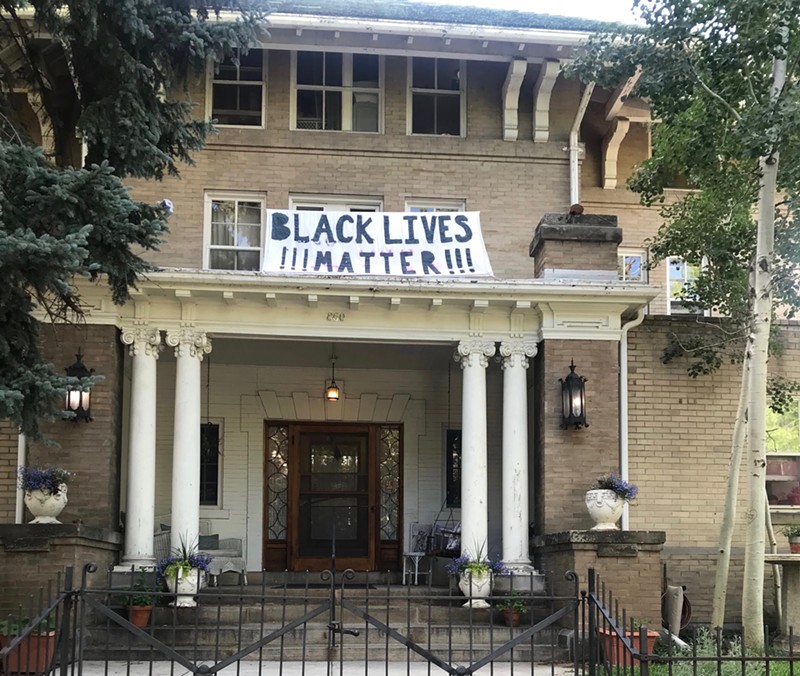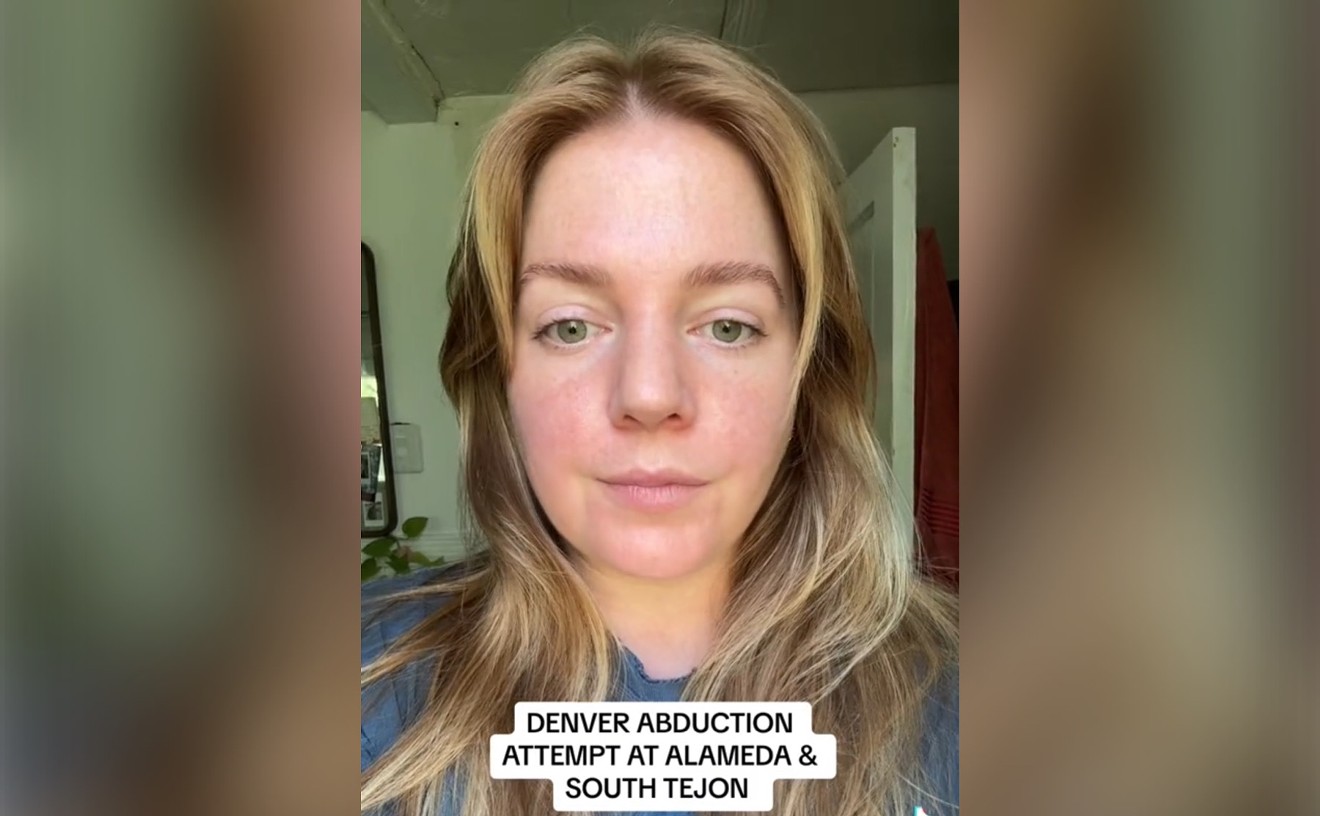In early June, residents of Mullen Mansion, a Cornerstone Apartments building at 860 Emerson Street, were told that they couldn’t display a banner with the words “Black Lives Matter” on the outside of their building.
Residents of four of the units in the seven-apartment building had created the sign. After attending a Black Lives Matter protest on June 1, they started discussing their own experiences with injustice, and on the following day hung the nine-foot-by-three-foot banner over the main entrance to Mullen Mansion. But on June 5, manager Keith Black emailed all the residents, saying the banner had to come down immediately.
"We understand that these are unprecedented times and the importance of the community having their voices heard, but any signage that has been installed without the permission of the Agent must be removed," his email said.
The residents took the sign down, but they were up for a fight.
In response to his June 5 email, one resident emailed Black with the offer of coming up with a safer way to hang the sign. “There is nothing negative or insulting toward anyone in this gesture, just a statement of solidarity and support for those who have been marginalized and killed because of only their skin color,” she wrote.
In his response, Black noted that Cornerstone doesn’t allow political or personal messages of any kind to be posted in or on its buildings. He also pointed out that hanging such signs could damage property, and referenced section 19 of the rental agreement: “Residents shall not make any alterations to the Premises, place stickers, deface or permit the defacing of any part of the Premises.”
But the resident didn't give up, and asked what Cornerstone Apartments was doing to support communities of color. "Once again I understand the sign situation is dead, I’m not trying to argue about that," she wrote. "I am hoping to move forward and come to a conversation about what CAN be done in regards to showing support for our community of color."
Hannah Sumeracki, another resident, called Black shortly after receiving the email; she says he told her that while he personally supports the Black Lives Matter movement, he was just doing his job. And on June 15, after she'd contacted him again, Black told her that if residents didn't comply with the sign rules, they would face eviction, she recalls.
“I would encourage him to find a new way to do his job, because this is really important right now,” Sumeracki says. “They should allow people to show support for the Black Lives Matter movement.”
Getting what they deemed to be no real response from Black, the residents of Mullen Mansion banded together and created an action day, which they called Capitol Hill Conscious Conversations, to bring awareness to their complaint that Cornerstone was silencing its residents.
The event was held outside Mullen Mansion on June 20; the residents handed out 100 fliers and 25 boxes of chalk, and invited people to write messages in support of communities of color outside their own homes. “As renters in a predominantly white, affluent neighborhood we have a responsibility to support and further the conversation around inequality that is happening down at the capitol,” read the flier. Across the street, a neighbor hung the residents' "Black Lives Matter" sign on his own property.
Alhough Sumeracki doesn't agree with Cornerstone's sign policy, she appreciates that it brought residents together in a positive way. “It really inspired us to have these conversations,” she says. “Whether or not Cornerstone makes these changes, we want to inspire other Cornerstone residents to educate themselves and take action in support of the Black Lives Matter movement.”
Black referred all questions about the banner incident to Jim Lorenzen, owner of Cornerstone, the largest apartment management company in Denver, handling over 200 buildings and 4,500 units, according to the Colorado Real Estate Journal.
Pointing to Cornerstone's liability policy, Lorenzen says that the resident who hung the sign at Mullen Mansion was on top of the roof, drilling into the 115-year-old chimney. There are plenty of ways for residents to practice self-expression, he adds, but not at the expense of other people’s enjoyment of the property, and not at the expense of safety.
“It has nothing to do with Black Lives Matter,” he explains. “It’s about the fact that the sign was hung from the roof and drilled in. We can’t have our residents on roofs.”
(A resident says that nothing was drilled for the sign's installation and disputes that it was hanging from the chimney.)
Cornerstone’s policy allows residents to put up signs in the personal space within their units, but not across balconies or porches. “We don’t allow residents to drape anything over our buildings, because we consider that public space,” Lorenzen says.
But Lorenzen notes that he's been re-evaluating his company’s policies in response to the racial-justice movement sweeping the nation. An email sent to all Cornerstone residents on June 26 details the steps he’s taken: He’s adjusted the language of the lease agreement, prohibiting any kind of racist behaviors; he’s changed community rules to be more stringent on cracking down on racial slurs; he’s made a donation to the Equal Justice Initiative. He's also gotten more specific on his flag/sign policy: “No flags, signs, posters or banners with discriminatory or inflammatory content are permitted on balconies, doors, windows or patios."
Community-building is one of Lorenzen’s biggest priorities, he says. Cornerstone openly supports the Pride parade, helps sponsor the City Park Jazz Festival, hosts a large Halloween party, promotes local businesses and has an active social media presence. Lorenzen also wants to be communicative in a real way with tenants, he says, helping residents with rent and jobs during the pandemic. For example, Cornerstone sent residents an email on June 1 saying that the company would continue to offer assistance and accommodations as best it could for those affected by the virus; it promised to waive late fees, cover banking fees associated with credit/debit card payments and accept partial payments through the month. On July 1, residents received another email from Cornerstone saying that the company would continue these policies through July.
Lorenzen says he isn't just concerned with tenants; he wants employees to feel safe, comfortable and supported, too. Cornerstone's staff is diverse and reflects the market it serves, he notes: Out of roughly 100 employees, five are black. “We have people from all races on my staff — Asians, Chinese, Japanese and Latinos," he adds. "This isn’t a bunch of white fraternity boys running an urban apartment management company.”
“Here’s the irony of you calling me about Mullen Mansion,” he continues. “That tenant calls us out, but Keith [Black] is engaged to a black woman. … People’s emotions are getting the better of them right now, and they’re not getting the full story.”
Cornerstone has been the focus of different versions of the same story before. In 2018, Lorenzen actively spoke out against a Denver City County ordinance before it went into effect January 1, 2019, making it illegal for landlords to refuse housing to potential renters based on income sources, including Social Security, housing vouchers/Section 8, child support, student loans and veterans' benefits.
According to Lorenzen, Section 8 payments often take longer to be delivered, and his buildings can’t sustain this delay; Section 8 move-outs are typically more expensive to clean up, too. “I’m just talking about the facts here,” he says. “I’ve got the numbers. And I just don’t have recourse to collect that money.”
He explains that Cornerstone is more affordable across the board than most Denver apartments; the average rent in the metro area is $1,500 a month, and the average rate at Cornerstone is $1,250.
Income discrimination is separate from the Black Lives Matter movement, he notes. “It’s not an income or racial issue,” Lorenzen explains. “Sometimes things are well intended, but people don’t fully appreciate the consequences.”
But for Sumeracki, the two issues tie directly together.
“Not only are they perpetuating the housing crisis and inequality in Denver by being against this ordinance, but now they’re perpetuating inequality by taking an arbitrary stance against the signs,” she says.
She recognizes the recent steps that the company has taken to respond to the racial-inequity issue. “We do appreciate that Cornerstone has donated some money and that they have changed their policy from no signs to no derogatory signs,” she says. “But it’s important to note that this comes after threatening to evict us for having a ‘Black Lives Matter’ sign just weeks before, which they don’t acknowledge.”
“We’re not in the political business,” Lorenzen responds. “It sounds like we’re trying to back out of this thing, but we have to be a little bit like Switzerland here.”
[
{
"name": "Air - MediumRectangle - Inline Content - Mobile Display Size",
"component": "12017618",
"insertPoint": "2",
"requiredCountToDisplay": "2",
"watchElement": ".fdn-content-body",
"astAdList": [
{
"adType": "rectangle",
"displayTargets": "mobile"
}
]
},{
"name": "Editor Picks",
"component": "17242653",
"insertPoint": "4",
"requiredCountToDisplay": "1",
"watchElement": ".fdn-content-body",
"astAdList": [
{
"adType": "rectangle",
"displayTargets": "desktop|tablet"
},{
"adType": "rectangle",
"displayTargets": "desktop|tablet|mobile"
}
]
},{
"name": "Inline Links",
"component": "18838239",
"insertPoint": "8th",
"startingPoint": 8,
"requiredCountToDisplay": "7",
"maxInsertions": 25
},{
"name": "Air - MediumRectangle - Combo - Inline Content",
"component": "17261320",
"insertPoint": "8th",
"startingPoint": 8,
"requiredCountToDisplay": "7",
"maxInsertions": 25,
"watchElement": ".fdn-content-body",
"astAdList": [
{
"adType": "rectangle",
"displayTargets": "desktop|tablet"
},{
"adType": "rectangle",
"displayTargets": "desktop|tablet|mobile"
}
]
},{
"name": "Inline Links",
"component": "18838239",
"insertPoint": "8th",
"startingPoint": 12,
"requiredCountToDisplay": "11",
"maxInsertions": 25
},{
"name": "Air - Leaderboard Tower - Combo - Inline Content",
"component": "17261321",
"insertPoint": "8th",
"startingPoint": 12,
"requiredCountToDisplay": "11",
"maxInsertions": 25,
"watchElement": ".fdn-content-body",
"astAdList": [
{
"adType": "leaderboardInlineContent",
"displayTargets": "desktop|tablet"
},{
"adType": "tower",
"displayTargets": "mobile"
}
]
}
]











